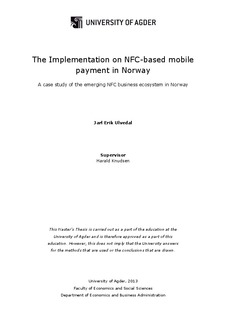| dc.description.abstract | This master thesis looks at the emergence of mobile payment in Norway with a focus on NFC technology. NFC based mobile payments represent a relative new technology that can be used in a relative new business area, which is that of mobile payments. The move towards mobile payment can be the beginning of a shift from traditional payment forms, such as cash and payment cards, to a new and modern way of conduction payments, using your own personal mobile phone. For the unobservant eye, the idea can seem like a scenario taken out of a Hollywood movie. The reality is that the technology already surrounds us in our everyday life. Many of us already use the technology in the form of a public transportation ticket or as an access card to the local gym. Now, there is an increasing attention around the world towards NFC technology as a way of conducting payments. In Norway it is no different.
In this paper, I explore the emergence of NFC based mobile payment in Norway based on seven interviews with industry expert in seven different stakeholder companies. Each of the interviewed subjects was selected specifically based on their company position, knowledge and expertise in the field of mobile payment technology. The companies represented in the interviews were DNB, Telenor, Teller, OfficeLink, NorgesGruppen, WyWallet and TrustNordics. The empirical investigation gave a tremendous amount of data that could be analyzed in conjunction with textbook literature, scientific articles and other related sources of information.
In this study, I find that NFC technology infrastructure is well on its way into the Norwegian market in various forms. The most progress seems to be related to NFC based contactless payment terminals, both hardware and software, which represent one of the most critical infrastructure necessities. On the other side, providers of NFC services have yet to fully launch their products to the customers. Investigation shows that there are still some challenges that need to be dealt with before NFC mobile payment becomes a mainstream service. First of all of these challenges relates to the collaboration and competition amongst stakeholders in the NFC ecosystem. Accordingly, some of the challenges are the current number of participating stakeholders, type of business models, Secure Element (SE) location and distribution, NFC payment transaction costs, security and the role of the Trusted Service Manager (TSM). A second set of challenges is relates to the customer adoption of the NFC based mobile payment service. Currently, the amount of customer compatible mobile phones is not sufficient. A different problem is how to get the customer to use the service, once they
have a compatible device, which relates to factors such as customers perceived usefulness, perceived ease of use, utility, security and other customer related behavior attitudes.
The questions identified are considered highly relevant for the emergence of NFC mobile payment. Although this thesis does not intend to answer these questions, both the theoretical and empirical research should guide involved stakeholders and managers to deal with the economic aspect of NFC based mobile payment. This can help to identify important directions for participants of the NFC ecosystem. | no_NO |
